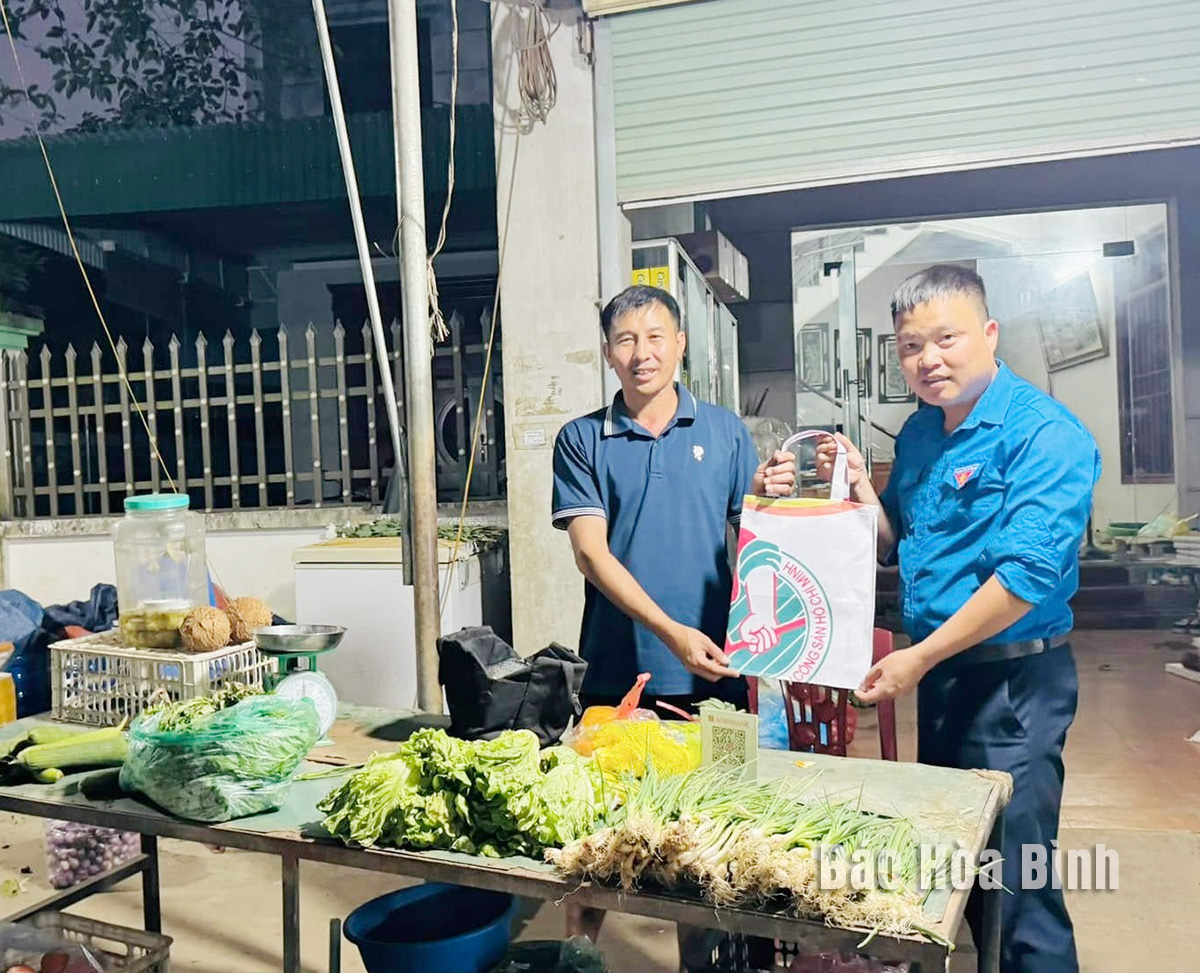
Living green is a healthy, positive, and sustainable lifestyle that not only helps protect
the environment and quality of life but also conserves natural resources and ecosystems.
Among the many ways to embrace this lifestyle, reducing plastic consumption is one of the most impactful.
Youngsters in Tan Lac district gift eco-friendly tarpaulin bags to vendors at Phong
Phu market in Phong Phu commune.
Recognising the environmental and societal harms of plastic waste, young people in Hoa Binh
have actively and creatively taken the lead in the campaign against plastic waste. Over the past
year, the Ho Chi Minh Communist Youth Union of the province and the union of Lac Thuy
district, in collaboration with their peers from Agribank’s Lac Thuy branch, launched the
eco-friendly market model at the central market of Phu Nghia commune. Similarly, the Ho Chi
Minh Communist Youth Union of Kim Boi district has implemented the same model at Danh
market in Dong Bac commune. The union of Hoa Binh has maintained two anti-plastic waste
models in Dan Chu and Tan Hoa wards.
At the same time, grassroots-level chapters of the union have stepped up communications
efforts to raise awareness of plastic waste hazards, encouraging and supporting households in
waste sorting at source, shifting daily habits, and reducing the use of single-use plastic items
and plastic bags in favour of organic, eco-friendly alternatives. These efforts have gradually
helped reduce plastic waste and protect the local environment.
Unlike in the past, Nguyen Thi Hai of Phuong Lam ward in Hoa Binh city now brings reusable
cloth or plastic baskets when shopping at the market instead of using plastic bags. Lam said
that previously, she often come home from the market with around ten plastic bags. The
convenience made it a hard habit to break. But after hearing warnings from the authorities and
awareness campaigns from local unions and organisations about how harmful and
non-biodegradable plastic bags are, she has gradually changed. "Now, I only use cloth bags or
baskets for groceries. This simple switch has significantly reduced my family’s plastic waste,”
she said.
It’s not just young people, many residents have become more proactive and self-aware about
sorting waste at source. Recyclable waste is collected and sold to raise funds. A typical
example is the women’s association in residential zone 5 in Thinh Lang ward of Hoa Binh city,
which has effectively run a model where members collect and sell recyclable materials to fund
health insurance cards for disadvantaged members. Launched in September 2023, the initiative
has been enthusiastically embraced. Each day, members collect recyclables such as plastic
bottles, cans, and cardboard from their households. On the 25th day of every month, they
gather to sort and sell the materials. The funds are then used to purchase health insurance for
members in need, supporting them with better access to healthcare.
Hoang Thi Hai Trieu, Chairwoman of the Women’s Union of Thinh Lang ward, said that this
waste-collection model has proven practical and impactful. It not only promotes environmental
protection and reduces plastic waste but also strengthens solidarity, mutual support, and
resourcefulness within the community. It has helped foster a culture of saving and collective
responsibility, enhancing the union’s activities, she added.
Through simple behavioural changes like bringing cloth bags to the market, cutting down on
plastic bag use, and avoiding single-use plastics, people are collectively contributing to building
a greener, more sustainable living environment. Every small action matters.
More than just an information technology teacher, Bui Van Nien is an inspiring figure who has nurtured the scientific curiosity and creative spirit of students in Vietnam’s ethnic minority communities.
Da Bac is the most disadvantaged mountainous district in Hoa Binh province, with ethnic minorities accounting for about 90% of its population. Over the past years, the district has mobilised resources to implement ethnic policies to improve the quality of life of local people.
In recent years, Hoa Binh province has consistently prioritised the protection, care, and education of children, particularly those from ethnic minorities and disadvantaged backgrounds, by creating a safe, healthy, and nurturing environment for their all-round development.
The Steering Committee for Tobacco Harm Prevention and Control of Hoa Binh province, in coordination with the Tobacco Harm Prevention and Control Fund, held a ceremony on May 28 in response to the World No Tobacco Day (May 31) and the National No Tobacco Week (from May 25 to 31). The event was chaired by Nguyen Van Toan, Standing Vice Chairman of the provincial People’s Committee and head of the Steering Committee.
Since 2021, the Center for Industrial Promotion and Industrial Development Consulting (CIIDC) under the Department of Industry and Trade has been implementing a school lighting model as part of the plan for using energy efficiently and economically in Hoa Binh Province in the pẻiod of 2021 - 2025. This model not only aims to improve the learning conditions and enhance the education quality, but it also promotes the message of energy saving, energy security, environmental protection and contributes to the goals of socio-economic development.
In the 2024 - 2025 school year, the entire Hoa Binh provincial education sector includes 520 educational institutions and schools. Among them are 13 ethnic boarding schools with 153 classes and 4,487 students. Four of these schools have met national standards, reaching 30.7 percent.



